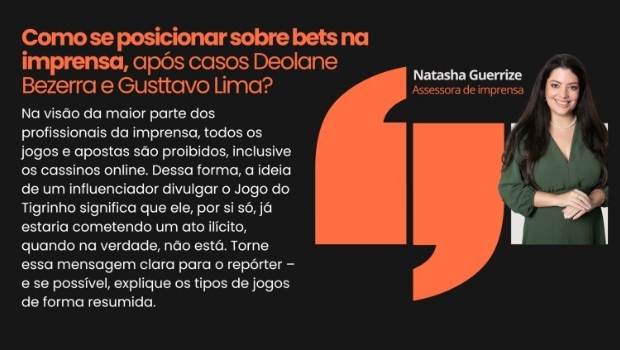
The field of Gaming Law has been gaining prominence with the new rules from the Ministry of Finance and controversies such as advertising, money laundering, and result manipulation involving bets. Given this scenario, many professionals wonder: should I cater to the mainstream media? How can I position myself assertively? The press officer from M2 Legal Communication agency, Natasha Guerrize, has prepared a complete article on the topic.
One of the 'youngest' areas of Juridical Sciences, Gaming Law has been gaining space in the media due to the rules published by the Ministry of Finance and also due to some controversies related to advertising, money laundering, and even cases of result manipulation in football involving bets.
Although Brazil has always shown potential in the sector - from the creation of the first lotteries in Colonial Brazil to the broad legalization of physical casinos by President Getúlio Vargas in 1933 - discussions about the regulation of games began to gain strength especially in the 1990s and, more recently, with Law 13.756/2018.
But only last year, after lengthy discussions and changes in the texts of PL 3626, Brazil definitively gained a law regarding the regulation of sports betting and online games – Law 14.790/2023.
It is evident that you, as a lawyer active in the area, are already aware of this. You must also be aware of the numerous reports citing the arrest warrants of influencer Deolane Bezerra and singer Gusttavo Lima, involved with betting houses, in operations carried out by the Federal Police.
After these cases, numerous headlines came to light in the mainstream media, attributing the blame to bets for all the crises in the country and the world:
“Bets are the new crack”
“Bets and Tigrinho cause divorce in Brazil”
“Betting market takes resources from consumption”
“Spending on bets causes class B to eat out less often”
“Retail company files for bankruptcy; increased spending on bets is one of the reasons”
And the list goes on.
The great challenge for the specialist in Gaming Law is this: for the most part, their clients are B2B – which corresponds to the market players themselves. In practice, topics in non-segmented media will always focus on the consumer, resulting in a more negative bias for the industry.
In this apparent context of 'witch hunt', you might wonder: should I cater to the mainstream media? And if so, how can I position myself assertively and consolidate my practice in the area?
Below, I bring five tips for you, lawyer, who seeks to consolidate in one of the most promising industries in the media:
1) Do not try to confront directly
A common mistake is for the specialist to want to pick a fight with the media, questioning the journalist about the narrative against bets. In this case, the editorial line of most media outlets is already established like this. Trying to change it is shooting yourself in the foot. Besides not being effective, you might permanently close doors at the media outlet. Understand the press as an ally in building image and reputation.
2) Align your speech with your press officer
If you are not yet secure with a media request, seek guidance from your press officer. Often, the media will not pass on the questions, especially on more sensitive topics. If necessary, also hire a Media Training service, so that you participate in interview simulations with specific and challenging questions to the sector (it is worth noting that M2 Legal Communication offers this service directed at lawyers).
3) Endorse the narrative of responsible gaming
The requirement of a responsible gaming policy is stipulated in Law 14.790/2023 – and it is essential for the journalist to understand that properly regulated bets need, indeed, to practice the rules ranging from the awareness that betting is not an investment, but entertainment, among other campaigns to combat gambling addiction. Repeat this message as many times as necessary, especially in live interviews, where there is no chance of editing the material.
4) Be proactive and didactic
Given Brazil's history, especially with the physical 'jogo do bicho' - which constitutes a criminal offense - the image of games is not the best. In the view of most media professionals, all games and bets are prohibited, including online casinos. Thus, the idea of an influencer promoting the 'Jogo do Tigrinho' means that he, by himself, would already be committing an illegal act, when in fact, he is not. Make this message clear to the reporter – and if possible, explain the types of games in a summarized form.
5) Compile recent and relevant data
Journalists love data – the more recent, the better. Immerse yourself in the gaming sector, talk to clients (and potential clients) and create a database that can be sent to journalists, especially regarding positive impacts on Brazil's economy.
Natasha Guerrize
Press officer
M2 Legal Communication is an integrated communication agency, dedicated to lawyers and law firms.









